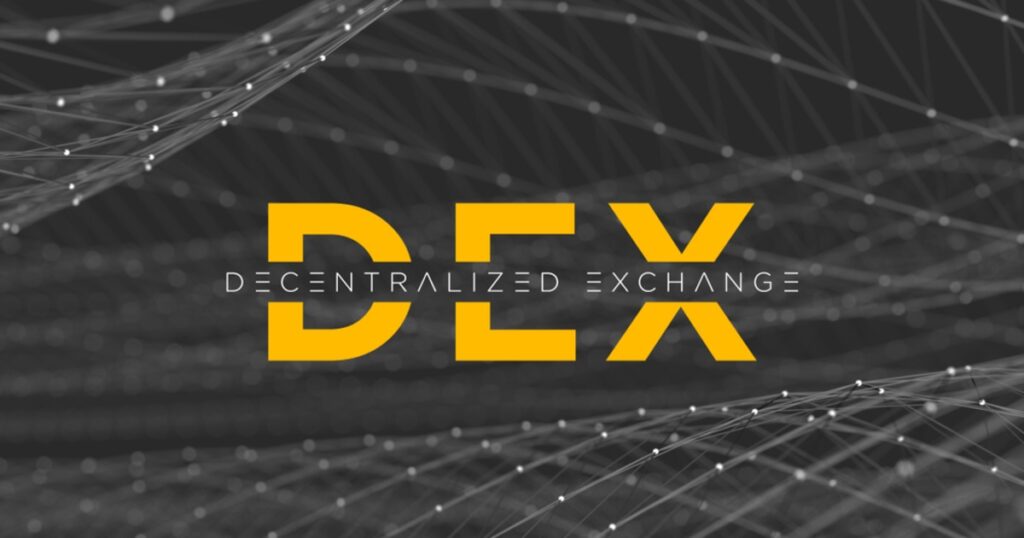Welcome to the world of decentralized exchanges (DEX), where traditional financial systems are being revolutionized. In this rapidly evolving digital landscape, businesses are turning to DEX as a powerful tool to enhance their operations and unlock new possibilities. But what exactly is a DEX and why are businesses flocking to it? Simply put, a DEX is a peer-to-peer platform that allows users to trade cryptocurrencies directly without the need for intermediaries.
This decentralized approach not only eliminates the reliance on third parties, but also brings numerous benefits to businesses. From enhanced security and privacy to lower fees and faster transactions, DEX offers a seamless and efficient trading experience. In this article, we will dive deep into the use cases and benefits of DEX for businesses, shedding light on why it’s becoming an increasingly popular choice in the digital marketplace. Get ready to explore the power of decentralized exchanges!
Table of Contents

How decentralized exchanges work
Decentralized exchanges operate on blockchain technology, which enables peer-to-peer transactions without the need for a central authority. Unlike traditional exchanges, where buyers and sellers rely on intermediaries to facilitate trades, DEX allows users to interact directly with each other. This is made possible through the use of smart contracts, which are self-executing contracts with the terms of the agreement directly written into code. These smart contracts ensure that transactions are transparent, secure, and irreversible.
One of the key features of DEX is the use of liquidity pools. Liquidity pools are pools of funds contributed by users that enable instant trading without the need for a centralized order book. Instead of relying on a central entity to match buyers and sellers, DEX utilizes these liquidity pools to ensure that there is always sufficient liquidity for trading. This decentralized approach not only eliminates the risk of hacking or manipulation associated with centralized exchanges but also allows for faster and more reliable transactions.
Decentralized exchanges can be accessed through web interfaces or dedicated applications. Users maintain control of their funds by connecting their digital wallets to the DEX platform. This eliminates the need to deposit funds into a centralized exchange and reduces the risk of hacks or theft. The use of blockchain technology ensures that transactions are recorded on a public ledger, providing transparency and accountability.
The underlying technology and mechanisms of DEX make it a secure, transparent, and efficient platform for businesses to engage in cryptocurrency trading without the need for intermediaries.
Advantages of decentralized exchanges
Decentralized exchanges offer a wide range of advantages for businesses looking to engage in cryptocurrency trading. Let’s explore some of the key benefits that make DEX an attractive option:
Enhanced security and privacy: One of the primary advantages of DEX is the enhanced security and privacy it offers. Unlike centralized exchanges, where users need to trust a third party with their funds, DEX allows users to maintain control of their funds throughout the trading process. With transactions being executed through smart contracts, the risk of hacks or theft is significantly reduced. Additionally, DEX does not require users to provide personal information, ensuring privacy and anonymity.
Lower fees: Traditional exchanges often charge high fees for trading and withdrawals. In contrast, DEX typically has lower fees due to the absence of intermediaries. Users only pay transaction fees to cover the cost of executing smart contracts on the blockchain. This cost-saving advantage is particularly beneficial for businesses engaging in frequent or large-volume trades, as it can significantly reduce overall trading costs.
Faster transactions: Another advantage of DEX is the speed of transactions. Since DEX operates on blockchain technology, transactions are executed directly between users without the need for intermediaries. This eliminates the delays associated with centralized exchanges, where trades are often subject to order matching and processing times. In DEX, transactions are settled instantly or within a few minutes, allowing businesses to execute trades quickly and efficiently.
These advantages make DEX an attractive option for businesses looking to streamline their cryptocurrency trading operations and take advantage of the benefits offered by decentralized finance (DeFi). In the next sections, we will dive into the various use cases of DEX for businesses and explore how it can be integrated into their operations.
Use cases for businesses in decentralized exchanges
Decentralized exchanges offer a wide range of use cases for businesses, enabling them to leverage the power of blockchain technology and cryptocurrencies in various ways. Let’s explore some of the key use cases:
Token issuance and fundraising: DEX provides businesses with a platform to issue their own tokens and raise funds through Initial Coin Offerings (ICOs) or Security Token Offerings (STOs). By leveraging the decentralized nature of DEX, businesses can reach a global audience and raise funds without the need for traditional intermediaries. This opens up new opportunities for startups and established businesses alike to access capital and fuel their growth.
Liquidity provision: DEX allows businesses to provide liquidity to the platform by contributing their funds to liquidity pools. By doing so, businesses can earn fees and incentives for facilitating trades on the platform. This not only generates passive income but also helps to ensure the availability of liquidity for other users. Liquidity provision can be particularly beneficial for businesses that hold a significant amount of cryptocurrency and want to make their funds work for them.
Cryptocurrency trading: One of the primary use cases of DEX is cryptocurrency trading. Businesses can use DEX to buy and sell cryptocurrencies directly, without the need for intermediaries. This enables businesses to take advantage of the volatility and potential profit opportunities in the cryptocurrency market. Additionally, DEX allows for the trading of various tokens, including stablecoins, which can be used for seamless cross border transactions or as a store of value.
These use cases demonstrate the versatility and potential of DEX for businesses. Whether it’s raising funds, providing liquidity, or engaging in cryptocurrency trading, DEX offers a decentralized and efficient platform for businesses to harness the power of blockchain technology.
Increased security and privacy in decentralized exchanges
One of the key advantages of decentralized exchanges (DEX) is the increased security and privacy it offers to businesses. In the traditional financial system, businesses often have to rely on third party intermediaries to facilitate transactions. This introduces a level of risk and vulnerability, as businesses need to trust these intermediaries with their funds and sensitive information. DEX eliminates the need for intermediaries, allowing businesses to maintain control of their funds and ensuring a higher level of security.
In DEX, transactions are executed through smart contracts, which are self-executing contracts with the terms of the agreement directly written into code. These smart contracts are stored on the blockchain, a decentralized and distributed ledger that ensures transparency and immutability. By leveraging blockchain technology, DEX eliminates the risk of hacks or manipulation that can occur in centralized exchanges. Since transactions are recorded on a public ledger, they can be easily audited and verified, providing an additional layer of security.
DEX does not require users to provide personal information, ensuring privacy and anonymity. Traditional exchanges often require businesses to go through a lengthy and intrusive Know Your Customer (KYC) process, where they need to provide identification documents and personal information. This not only raises privacy concerns but also increases the risk of data breaches or identity theft. In DEX, businesses can trade cryptocurrencies without revealing their identity, providing them with greater privacy and protection.
Overall, the increased security and privacy offered by DEX make it an attractive option for businesses looking to engage in cryptocurrency trading without compromising the safety of their funds or sensitive information.
Cost-efficiency and accessibility of decentralized exchanges
Decentralized exchanges (DEX) offer businesses a cost-efficient and accessible platform for cryptocurrency trading. Unlike traditional exchanges, which often charge high fees for trading and withdrawals, DEX typically has lower fees due to the absence of intermediaries. Users only pay transaction fees to cover the cost of executing smart contracts on the blockchain. This cost-saving advantage is particularly beneficial for businesses engaging in frequent or large-volume trades, as it can significantly reduce overall trading costs.
DEX eliminates the need for businesses to deposit funds into a centralized exchange. In traditional exchanges, businesses need to transfer their funds to the exchange’s wallet, which introduces a level of risk and requires trust in the exchange’s security measures. With DEX, businesses can maintain control of their funds by connecting their digital wallets directly to the platform. This reduces the risk of hacks or theft associated with centralized exchanges and provides businesses with greater peace of mind.
Another aspect that makes DEX accessible is its global nature. Traditional exchanges often have restrictions on who can participate based on geographical location or regulatory requirements. DEX, on the other hand, operates on blockchain technology, which is borderless and accessible to anyone with an internet connection. This opens up new opportunities for businesses to engage in cross border transactions and access global markets without the limitations imposed by traditional financial systems.
Overall, the cost-efficiency and accessibility of DEX make it a compelling option for businesses looking to optimize their cryptocurrency trading operations and reduce trading costs.
Potential challenges and limitations of decentralized exchanges
While decentralized exchanges (DEX) offer numerous benefits for businesses, they also come with their own set of challenges and limitations. It’s important for businesses to be aware of these factors and consider them when deciding whether to adopt DEX in their operations.
One of the main challenges of DEX is the lack of liquidity compared to centralized exchanges. Liquidity refers to the availability of buyers and sellers in a market, and it plays a crucial role in ensuring efficient trading. Since DEX operates on liquidity pools contributed by users, the availability of liquidity can vary depending on the platform and the specific tokens being traded. This can result in lower trading volumes and potentially higher slippage, which is the difference between the expected price of a trade and the actual executed price. For businesses engaging in large-volume trades or trading less popular tokens, this lack of liquidity can be a limitation.
Another challenge is the user experience of DEX platforms. While DEX has made significant strides in terms of user interfaces and functionality, it still requires a certain level of technical knowledge and familiarity with blockchain technology. The process of connecting digital wallets and executing trades through smart contracts can be daunting for businesses that are not familiar with these concepts. Additionally, the speed and responsiveness of DEX platforms may vary depending on network congestion or the underlying blockchain technology being used. This can result in delays or slower transaction times compared to centralized exchanges.
Regulatory considerations are also important to take into account when considering DEX for businesses. The regulatory landscape surrounding cryptocurrencies and blockchain technology is still evolving, and businesses need to ensure compliance with applicable laws and regulations. Depending on the jurisdiction, businesses may need to navigate through complex regulatory frameworks, such as anti-money laundering (AML) and know your customer (KYC) requirements. It’s crucial for businesses to consult legal and regulatory experts to ensure compliance when engaging in cryptocurrency trading through DEX.
Despite these challenges and limitations, the benefits offered by DEX, including increased security, lower fees, and accessibility, make it an appealing option for businesses looking to embrace the future of decentralized finance (DeFi). In the next sections, we will explore how businesses can integrate DEX into their operations and highlight best practices for using DEX effectively.
Integrating decentralized exchanges into business operations
Integrating decentralized exchanges (DEX) into business operations requires careful planning and consideration. Here are some key steps and considerations to keep in mind:
Research and choose the right DEX platform: There are numerous DEX platforms available in the market, each with its own features and characteristics. It’s important to research and evaluate different platforms based on factors such as liquidity, supported tokens, user experience, and security features. Look for platforms that align with your business requirements and have a proven track record in the industry.
Ensure security and compliance: Security should be a top priority when integrating DEX into your business operations. Ensure that the DEX platform you choose has robust security measures in place, such as multi-factor authentication, cold storage of funds, and regular security audits. Additionally, consider the regulatory implications of using DEX and consult legal and regulatory experts to ensure compliance with applicable laws and regulations.
Educate and train your team: Familiarize your team with the concept of DEX and provide training on how to use the platform effectively. This includes understanding the process of connecting digital wallets, executing trades through smart contracts, and managing funds securely. Investing in education and training will empower your team to navigate the DEX platform with confidence and maximize its potential.
Start small and test: When integrating DEX into your business operations, it’s advisable to start with small trades and test the platform’s functionality and user experience. This allows you to familiarize yourself with the platform and identify any potential issues or areas for improvement. Gradually increase the volume of trades as you gain confidence and experience with the DEX platform.
Monitor and evaluate performance: Regularly monitor and evaluate the performance of your DEX trading activities. Keep track of trading volumes, liquidity, fees, and any other relevant metrics. This will help you identify trends, optimize your trading strategies, and make informed decisions to maximize your returns.
By following these steps and considering the unique requirements of your business, you can effectively integrate DEX into your operations and leverage its benefits for cryptocurrency trading.
Best practices for using decentralized exchanges
To make the most out of decentralized exchanges (DEX), businesses should follow certain best practices to ensure a smooth and efficient trading experience. Here are some key practices to consider:
Stay informed and conduct thorough research: The cryptocurrency market is constantly evolving, and it’s crucial to stay informed about the latest trends, news, and developments. Conduct thorough research on the tokens you plan to trade and stay updated on market conditions. This will help you make informed decisions and minimize the risks associated with cryptocurrency trading.
Diversify your portfolio: Diversification is a key risk management strategy in cryptocurrency trading. Spread your investments across different tokens and asset classes to mitigate the impact of market volatility. DEX platforms often support a wide range of tokens, allowing you to diversify your portfolio easily.
Manage your risks: Cryptocurrency trading involves risks, and it’s important to have a risk management strategy in place. Set clear goals and limits for your trades, such as profit targets and stop loss orders. This will help you minimize losses and protect your investments.
Keep your digital wallets secure: Digital wallets are crucial for accessing and managing your funds on DEX platforms. Ensure that your wallets are secure by using strong passwords, enabling two factor authentication, and keeping your private keys in a secure location. Remember, in the decentralized world, you are your own bank, and thus, the responsibility of safeguarding your assets lies entirely with you. Avoid sharing sensitive information online and be wary of phishing scams that aim to steal your digital assets. Regularly update your wallet software to the latest version to ensure you have the most up to date security measures.
Consider using hardware wallets for storing larger amounts of crypto assets. These devices provide an extra layer of security by keeping your private keys offline and safe from potential hackers.
Always double check wallet addresses when making transactions. Human error can lead to an irreversible loss of funds in the DeFi space. It is a new financial landscape with immense potential, but it requires vigilance and proactive security measures. Always stay informed about the latest security practices, and remember, the safety of your digital assets is in your hands.
Embracing the future of decentralized finance (DeFi)
The future of decentralized finance (DeFi) is not merely a fad or buzzword; it is a financial movement that is poised to reshape our economic systems. DeFi has already redefined how we interact with money and financial services, in light of its promise to democratize finance, reduce costs, and promote financial inclusion.
Nevertheless, it is essential to recognize that DeFi, like any other innovative technology, faces obstacles. To promote its growth and widespread adoption, it is necessary to resolve security risks and regulatory concerns and educate users. As we enter this daring new financial era, it is imperative that we approach DeFi from a balanced perspective, recognizing both its enormous potential and obstacles.
Similar to how the Internet has transformed how we share information, DeFi may reshape how we conduct business and interact economically. DeFi offers a significant opportunity to democratize access to financial services and reshape the future of finance by leveraging the power of blockchain technology and cryptocurrencies.
It is a thrilling time to be part of this space’s evolution. By embracing DeFi, we are not only participating in a financial revolution but also paving the way for a future that is more equitable, inclusive, and transparent. Therefore, whether we are consumers, investors, or policymakers, we all play a role in shaping and assuring the responsible and beneficial growth of this burgeoning sector.

🚀Ready to embark on your crypto journey?💰🔒Secure, simple and rewarding – Crypto.com is your gateway to the future of finance!🌐💎Click here 👉👇to begin your adventure in the crypto universe today!🎉🏦
💼 Show your crypto flair! 💫 Dive in here 👇 for our special merchandise 🎉
🚨DISCLAIMER🚨
Investingcrypto717.com’s 🌐 content is solely educational🎓. NOT financial advice🙅♂️💼. Do your own research🔍💡, consult a professional before investing💼🤝. You invest at your own risk⚠️💸. #NotFinancialAdvice #InvestingCrypto717🔐🌍




